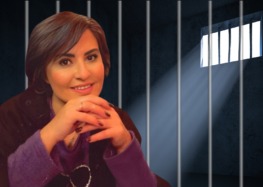Introduction
Twenty five women are known to be held in Evin Prison’s Women’s Ward as of this writing. Most are young, many are mothers. They are all political prisoners and prisoners of conscience—behind bars for expressing views, holding beliefs, or participating in activities with which the government of the Islamic Republic of Iran disagrees. There are dozens of female prisoners of conscience held across Iran; Evin’s Women’s Ward, known in Persian as Band-e Nesvan, is just one of the prisons in which they are held.
This report by the International Campaign for Human Rights in Iran aims to shine a spotlight on the women of this ward, and the harsh—indeed unlawful—conditions they endure. It is based on testimonies and eye- witness accounts, and confirmed by recently released prisoners of the ward and by family members of the ward’s prisoners.
These women are kept behind bars for speaking out for women’s rights, objecting to Iran’s death penalty policies, arguing against the politicized banning of students from university, criticizing government policy on social media, practicing a disapproved faith, participating in a peaceful demonstration, reporting on “for- bidden” topics, or, in any way, dissenting—peaceful- fully—from the political or social polices of the Islamic Republic.
Like all political prisoners in Iran, they have been arrested in violation of their rights under Iranian and international law to freedom of expression and belief and the right to peaceful dissent, and prosecuted and convicted in judicial proceedings lacking any semblance of due process.
Inside the ward, they endure conditions that include an egregiously substandard and dirty infirmary that lacks medical supplies and access to specialists, delayed or denied transfer to hospital or specialists for serious illnesses, inadequate nutrition, and intermittent heat in freezing conditions. These conditions leave the women with permanently broken health.
Like all political prisoners, they are subjected to harsher treatment than other prisoners. Rights and privileges afforded to other inmates are not afford- ed to them. Family visits and telephone communication—including with the young children of prisoners who are mothers—are often reduced or denied. Furloughs, the Iranian practice of allowing temporary leave to most inmates for medical reasons or for special familial events—are restricted or denied.
As this report will detail, the conditions of their incarceration violate multiple Iranian laws contained in the Islamic Republic’s constitution and in its State Prisons Procedures, and also violate multiple articles in inter- national treaties, such as the International Covenant on Civil and Political Rights (ICCPR), which Iran has signed.
Not all of the women incarcerated there are known and for some of the women, the information is tentative and incomplete. Those who are public figures are known, but some of the families of others do not release any information out of fear of possible repercussions for their imprisoned loved ones. Thus this report does not present a comprehensive picture of the women held in this ward.
Nevertheless, it aims to raise awareness of the women political prisoners and prisoners of conscience who are unjustly imprisoned in Iran, and the inhumane conditions they endure.
This report also seeks to put a spotlight on the Iranian Judiciary, which, under Iranian law and explicitly under Iran’s State Prison Procedures, has responsibility for the prisoners of the Islamic Republic.
As such, Iran’s Judiciary, and its Head, Sadegh Amoli Larijani, should immediately address the unjust im- prisonment of these women and the unlawful con- ditions they are subjected to, and it should be held accountable for the violations of the rights of the in- mates of Evin’s Women’s Ward by Iranian president Hassan Rouhani, who is the designated enforcer of Iran’s constitution, by United Nations bodies desig- nated to address human rights, and by all individu- al Member States in their bilateral relations with the Islamic Republic.


